Index relies entirely on the support of donors and readers to do its work.
Help us keep amplifying censored voices today.
“Media has a significant role in the theatre of the absurd,” a participant in a conference on the security and protection of journalists in western Balkan countries claimed.
Media workers and representatives from journalists’ associations in Croatia, Bosnia and Herzegovina, Serbia and Montenegro joined representatives of international organisations in Sarajevo in June 2015 to debate key issues facing the media in the region: attacks on journalists, impunity, the effectiveness of the legal system and institutional mechanisms to create a safe environment to work in.
Conference participants said media freedom is deteriorating and assigned responsibility for the decline on governments in the region, local media ownership and, especially, international institutions and organisations.
Goran Miletic, programme director for the western Balkans at Civil Rights Defenders, an NGO working in the area, said that in 2004 some of the international organisations decided to withdraw funding from local media to focus on other projects. Miletic said that reduced level of funding for media was a lost opportunity to prevent human rights abuses and further democratise the region.
International funding is vital to professionalising the media, which cannot rely on local government support. “If we analyse research on what people think of human rights defenders or journalists, they are often characterised as spies, foreign mercenaries, or enemies of the state,” said Miletic.
A lack of media plurality and news illiteracy were identified as concerns that have had a detrimental effect on the advancement of press freedom and professionalism in the region.
“Media freedom is once again one of the key challenges for the region,” said Andy McGuffie, head of the communication office of the Delegation of the European Union to Bosnia and Herzegovina and a European Union Special Representative.
Presidents of journalists’ associations focused on attacks on journalists and the effectiveness of the legal system and institutional components. Addressing the current situation in Croatia, Zdenko Duka, then president of the Croatian Journalists’ Association, underlined that “fortunately, [in recent months], there have not been too many physical assaults. Comparing assaults and threats against journalists to other countries in the region, the situation in Croatia is better.”
Croatia has a checkered history on media freedom. During the 1990s journalists were widely targeted and were under surveillance by the secret service. In the 2000s, the journalist Ivo Pukanic, was assassinated in a bomb attack at his Zagreb office. Though a court convicted six men for the murder, the person who ordered the crime has not been brought to justice.
Duka emphasised two 2014 physical assaults: an incident in Rijeka in which football club officials attacked a journalist and a photographer and the brutal attack on journalist Domagoj Margetic who was assaulted by several people near his home in Zagreb. Margetic sustained head injuries as a result of the attack, for which he received medical treatment.
Sanja Mikleusevic-Pavic, a journalist from Zagreb, agreed with Duka. “Croatia is in a much better situation than other countries,” she said. Key reasons for this include the Trade Union and the Journalists’ Association, which are very well organised and powerful, but most of all, the key role played by the public broadcaster HRT. “HRT is a strong, independent and professional public broadcaster,” said Mikleusevic-Pavic.
From her point of view, the main threat to independence and professionalism are pressures from tycoons and politicians, which, in her experience, are significant. The case of Croatian TV broadcaster RTL, which was found guilty of slander for airing a live show during which Croatian Prime Minister Zoran Milanovic accused Zagreb Mayor Milan Bandic of corruption, sets a negative precedent, particularly because another TV station that aired the same statement was not charged. As punishment, RTL has been ordered to pay 6,500 euros to the mayor.
Croatia’s new criminal code presents another obstacle to media freedom. It includes Article 148, introduced in 2013, which establishes an offence of “humiliation”, “shaming” or “vilification”. Osservatorio Balcani e Caucaso said the article would allow judges to sentence a journalist if the information published is not considered being in the public interest and “for the court, it is of little importance that the information is correct – it is enough for the principal to state that he felt humbled by the publication of the news.”
In April 2014, Jutarnji List journalist Slavica Lukic became the first Croatian journalist to be prosecuted under the article. She was found guilty of vilification. Lukic reported that a company had economic problems despite the substantial public funding it received. The company stated it felt “humiliated” and the judge fined her 4,000 Euros.
Dunja Mijatovic, OSCE Representative on Freedom of the Media, said in a letter to the Croatian officials that the current legal definitions of “insult” and “shaming” are “vague, open to individual interpretation and, thus, prone to arbitrary application.”
Duka said that there are more than 40 criminal insult cases pending against journalists in the country and this is clear evidence that “truth can be punishable.” Furthermore, he believes judges are not well prepared for defamation, slander and libel cases. Defamation in Croatia has not been decriminalised as it has been in Montenegro, Serbia and Bosnia and Herzegovina.
“The situation in Serbia is alarming. As long as there is a brutal assault on journalists, we cannot talk about freedom of speech and media freedom,” Vukasin Obradovic, president of the Independent Journalists’ Association of Serbia (NUNS), said in a speech at the conference.
From 2008 to 2014, Serbia has seen a total of 365 physical and verbal assaults, intimidation and attacks on the property of media professionals. Since May 2014 alone, Index’s European Union-funded Mapping Media Freedom project has received over 48 reports of violations against Serbian media, including attacks to property, intimidation and physical violence.
In his talk, Obradovic described several incidents to illustrate the media situation in Serbia. On 14 April 2007 a bomb exploded outside the apartment of journalist Dejan Anastasijevic. No one was injured. In a statement to international media, Anastasijevic said: “It was just before 3 am on Saturday when a hand grenade went off outside the bedroom window of my Belgrade apartment, filling the room with smoke and shards of glass, leaving shrapnel holes on the ceiling and walls — some only inches above the bed. Despite the damage, we were lucky: When the police arrived, they found a second unexploded grenade on the sidewalk nearby.”
Anastasijevic was targeted because of his investigative reporting on crimes in the former Yugoslavia and criminal syndicates in Serbia, local media reported. The most recent attack followed Anastasijevic’s criticism of a lenient verdict for members of Serb paramilitaries called “Scorpions,” journalists associations said. The case has still not been resolved.
Obradovic emphasised that attacks on journalists in Belgrade often get more attention than violations that take place outside the capital.
Vladimir Mitric, a journalist from the town of Loznica, has been under police protection since October 2005 after being subjected to a brutal assault. He was attacked as he entered his apartment and struck with a blunt instrument from behind several times. He ended up with a broken hand and was very badly bruised all over his body. He is disabled as a result of that attack.
“I live under police protection that I was granted by court, not police, at my request, which is important,” said Mitric in an interview with SEEMO. A former police officer was identified as the attacker and was sentenced to six months in jail by the Loznica Basic Court. The Belgrade Court of Appeal later doubled the sentence.
However, a few months after the trial, Tomislav Nikolic, the president of Serbia, granted amnesty to the attacker and the remainder of his sentence was vacated. Threats against Mitric continue despite 24-hour police protection. Human Rights Watch reported: “The person making the threats was accompanied by a police officer who had been responsible for Mitric’s protection. The person making the threats was charged with minor offences in September, but at this writing the police officer had not been disciplined.”
Sladjana Novosel, a journalist from Novi Pazar, was targeted three times between September 2010 and March 2013. Novosel was subjected to verbal attacks, shaming and bullying. Police have, so far, failed to pursue investigations of these threats.
In another incident, Davor Pasalic, the editor-in-chief of FoNet, was attacked twice early in the morning of 3 July 2014 as he made his way home from his office. The two attacks left him with cuts and bruises, and four of his teeth were broken or knocked out. After seven months of investigation and zero progress, Pasalic sarcastically said that his case is “no big deal.” But he added that the assault has had no impact on his work.
Obradovic finished his talk by saying that “the impunity and recklessness of institutions obviously encourage attacks.”
Branislava Opranovic, member of the executive board of the Independent Journalists’ Association of Vojvodina (NDNV), focused on economic issues and ownership transparency in the media. She described the lack of ownership transparency in the media, sharing her personal experience. “I have been working for the daily Dnevnik for years and years, but still don’t know who the owner of the newspaper is.” She also mentioned other cases, including one where a man in his twenties wanted to buy nine media outlets in Vojvodina, or the episode where her coworkers were waiting patiently in a line to collect bonuses of 5 Euros despite having not received their salaries.
Though Bosnia and Herzegovina was the first country from the region to decriminalise defamation, in 1999, the situation is no better than in Serbia. Borka Rudic, Secretary General of the BH Journalists Association, said: “The raid of the Klix.ba offices in late December 2014 just proves this conclusion.”
In that incident, police entered and searched Klix.ba’s Sarajevo offices for a recording of a phone call in which the Republika Srpska Prime Minister Željka Cvijanović talks about “buying off” politicians. Local media reported that police were copying material from the newsroom’s computers. The police also seized computers, documents, notes and other items from the offices, according to media reports.
Despite positive developments in the law over the past 15 years, the situation has shown little improvement, as institutions are failing to properly implement new legislation, meaning protection on journalists is weak. Between 2006 and 2014, there have been approximately 400 registered cases of media rights violations, including 40 physical assaults and 17 death threats.
Bosnian journalists use a name and shame strategy, in which the identity of every person who threatens or attacks a journalist is publicised. Rudic said that the most serious incident was the attack of Professor Slavo Kukic, a prominent writer and columnist, who was severely beaten with a baseball bat in his office at the University of Mostar, on 23 June 2014.
Marko, a journalist present at the event, shared his and a colleague’s personal experiences. While working for a public broadcaster they were both victims of constant harassment by one of their deputy editors, receiving no support from senior editors or directors. This resulted in them both being admitted to a psychiatric hospital for mental health issues.
Montenegrin TV host and journalist, Darko Ivanovic, told how one of his country’s prominent politicians stated: “it is customary law to hit journalists,” when asked why he slapped a journalist.
Over the last few years Ivanovic has had his car vandalised on a number of occasions, though only one incident resulted in the arrest of a suspect, who admitted the vandalism. However, when interviewed by Ivanovic, the suspect admitted that the police gave him 5 Euros so he confessed to the crime. “There is always someone found guilty, but usually they’re not the real perpetrators. And this puts into the question the effectiveness of the system,” Ivanovic said.
Marijana Camovic, President of the Trade Union of Media of Montenegro, said at the conference “the mindset of local politicians is that for them it is impossible that a journalist could be impartial and professional.”
Tabloids in Montenegro are used for smear campaigns. Civil rights activist Vanja Calovic became the victim of just such a campaign by Informer, a daily newspaper. The tabloid’s mid-June attack against the head of the MANS NGO began with the release of a video recording that, according to the paper, proved that Calovic was “an animal abuser” and alleged that she had sexual relations with her dogs.
The NGO Human Rights Action (HRA) highlighted the perilous state of journalism in its report, “Prosecution of Attacks on Journalists in Montenegro”. The HRA outlined 30 cases of threats, violence and assassinations of journalists as well as attacks on media property between May 2004 and January 2014. “Most of these attacks have not been clarified to date. In most cases certain patterns can be observed, for example: victims are the media or individuals willing to criticise the government or organised crime,” the report said.
One-third of all incidents happened in the the last year, which to the HRA shows the atmosphere of impunity is escalating. “Such an atmosphere of impunity threatens journalists in particular, who are often victims of unresolved attacks. If the state treats these attacks passively, it becomes responsible for the suppression of freedom of speech, the rule of law and democracy.”
The assassination of Editor-in-chief of the Daily Dan, Dusko Jovanovic, who was killed in a drive-by shooting on the evening of 27 May 2004, has not been solved nine years later. Damir Mandic, the only defendant in the recent trial, claims he is innocent and accused the police of planting evidence, Balkan Insight reported. Mandic said he was in prison for 10 years although he was innocent, and his human rights had been violated. He remains the only perpetrator to be convicted.
Seven years after the brutal attack that nearly took the life of journalist Tufik Softic, Montenegrin police detained two men suspected of involvement in his attempted murder. For media unions and observers, the detentions were long overdue, but emblematic of the atmosphere of impunity in Montenegro. In November 2007, Softic was brutally beaten in front of his home by two hooded assailants wielding baseball bats. Then in August 2013, an explosive device was thrown into the yard of his family home. The journalist has been provided with constant police security since February 2014.
Besides this atmosphere of impunity that threatens journalists, Camovic spoke of other phenomena. Approximately 80 per cent of all active media workers in Montenegro are not members of any journalist’s association. When asked why they’re not active in the organisations, they had no answer.
In summing up the situation, Ivanovic said that states and political parties deliberately tolerate grey or criminal activities of media owners so they can control them easily.
Mapping Media Freedom
|
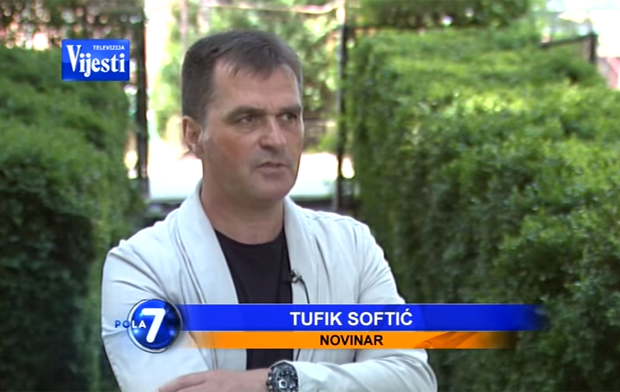
Seven years after the brutal attack that nearly took the life of journalist Tufik Softic, Montenegrin police detained two men suspected of involvement of his attempted murder. For media unions and observers, the detentions were long overdue, but emblematic of the atmosphere of impunity in Montenegro.
According to police, the men — VL and IA — were arrested in Budva on 17 July and charged with attempted murder in the 2007 attack on Softic, a reporter for the opposition daily newspaper Vijesti. After questioning by the state prosecutor, who confiscated their passports, the men were released the same day. Minister of Interior Rasko Konjevic also issued a statement on the case.
In November 2007, Softic was brutally beaten in front of his home by two hooded assailants wielding baseball bats. Then in August 2013, an explosive device was thrown into the yard of Softic’s family home. The journalist has been provided constant police security since February 2014.
OSCE Representative on Freedom of the Media Dunja Mijatovic welcomed the arrest of the two suspects for the attack on Softic. She also urged, “authorities of Montenegro to persist until all attacks on journalists, especially the murder of Dusko Jovanovic in 2004 are resolved and the perpetrators and masterminds are brought to justice”.
Journalists, the Media Union and NGOs emphasize that the atmosphere of impunity that has been created in Montenegro concerning attacks on journalists is the biggest threat to media freedom. The groups put the responsibility for the climate on authorities.
NGO Human Rights Action (HRA) highlighted the perilous state of journalism in their report Prosecution of Attacks on Journalists in Montenegro. The HRA outlined 30 cases of threats, violence and assassinations of journalists as well as attacks on media property between May 2004 and January 2014.
“Most of these attacks have not been clarified to date. In most cases certain patterns can be observed, for example: victims are the media or individuals willing to criticize the government or organized crime,” said the report.
One-third of all the incidents happened in the last year. For HRA, this is clear evidence that the atmosphere of impunity is escalating and inviting more attacks on journalists.
“Such an atmosphere of impunity threatens journalists in particular, who are often victims of unresolved attacks. If the state treats these attacks passively, it becomes responsible for the suppression of freedom of speech, the rule of law and democracy”, the group reported.
The European Parliament issued a resolution on the 2013 progress report on Montenegro expressed “grave concern about the increase in verbal and physical intimidation of journalists,” and “calls for all threats and attacks against journalists to be adequately investigated and prosecuted, including unresolved previous offences.”
UN Special Rapporteur on the promotion and protection of the right to freedom of opinion and expression, Frank La Rue, undertook an official visit to Montenegro from 11 to 17 June 2013. In the report that followed, he recommended that “the identification of responsibilities in all cases of violence and intimidation against journalists must be achieved without delay, so perpetrators are brought to justice.”
That police needed seven years to question any suspects in the brutal assault on Softic “could be used as an indicator of effectiveness and dedication of the police in resolving these cases”, underlined Marijana Camovic, chief of the Montenegrin Media Union. “Yes”, she said, “we welcomed the detention of two suspects, but let’s have in mind that this is just one of the many cases that need to be resolved.”
For the Media Union, it is a common occurrence for criminals and people with political ties to threaten, berate and attack journalists. “Nowadays journalism is the most dangerous profession in Montenegro and that is why we need extra protection,” said Camovic.
Human Rights Action has proposed the introduction of two new and amendments to criminal offenses: “Grave types of murder” and “Serious bodily injury” with the aim of increased protection for journalists in performing professional duties. In the same manner, the Media Union is advocating for similar amendments so journalists could have protection under the law on a par with police officers.
In December 2013, the Montenegrin government established a commission for monitoring actions of authorities in the investigation of cases of attacks on journalists. As a result of their work, in January 2014, Dusko Markovic, a deputy prime minister and justice minister, was questioned because it was alleged that he withheld information on the murder of Dusko Jovanovic, the editor-in-chief of the opposition newspaper Dan, in 2004. Montenegrin media reported that Markovic was the head of the secret service at the time.
More reports from Montenegro via mediafreedom.ushahidi.com
Arson attack on vehicles owned by Montenegrin daily
Politician and journalist discredit TV station
This article was posted on July 25, 2014 at indexoncensorship.org
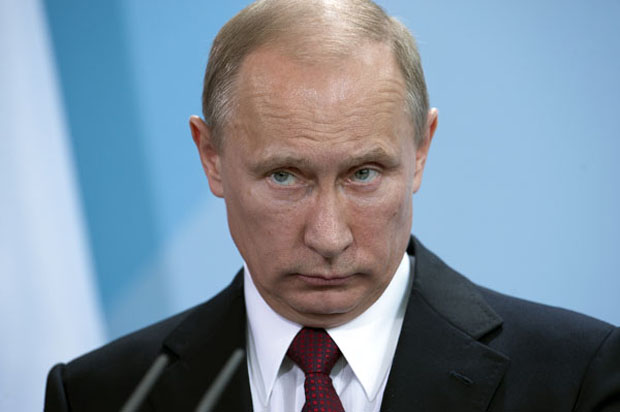
(Image: Gonçalo Silva/Demotix)
The Sochi Winter Olympics opening ceremony is taking place today, and organisers have declared that a record 65 world leaders are attending. But numbers alone don’t tell the whole story. As it turns out, some of the biggest names in global politics will not be in the stands cheer on their athletes as the games are officially kick off. Indeed, quite a few won’t be taking the trip to Sochi at all. Barack Obama is sending a delegation including openly gay figure skater Brian Boitano in his place, and Angela Merkel, David Cameron and Francois Hollande are also staying away.
But while the International Olympic Committee’s Thomas Bach was less than impressed by the apparent boycott, labelling it an “ostentatious gesture” that “costs nothing but makes international headlines”, the absence of the big guns does give the lesser-known world leaders a chance to shine. Not all guests have been confirmed, but we’ve got the low-down on some of the the leaders the cameras might pan to during today’s festivities, or who could be spotted in the slopes over the coming weeks.
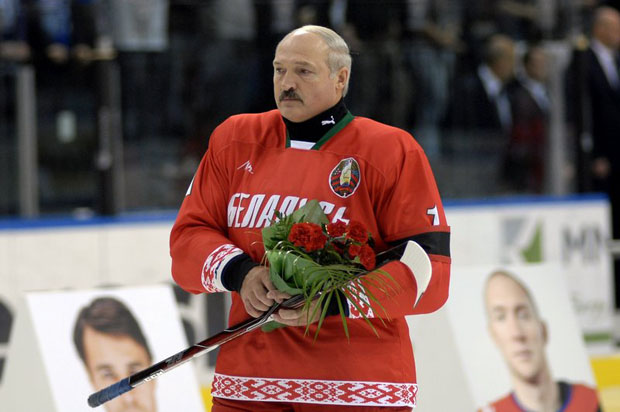
(Image: Ivan Uralsky/Demotix)
Putin’s long time colleague and fellow ice hockey enthusiast surely wouldn’t miss the Winter Olympics for the world. The Belarusian president is known as “the last dictator in Europe”, his near 20 years in power having passed without a single free and fair election. Under his leadership, peaceful protests have been violently dispersed, and civil society activists and political opposition — including rival candidates from the 2010 presidential elections — have been jailed. A brand new report from Index also concludes that: “Belarus continues to have one of the most restrictive and hostile media environments in Europe.”

(Image: Philip Janek / Demotix)
The Turkish president made global headlines last summer, over his regime’s violent crackdown on the peaceful Gezi park demonstrations. Rather than accepting the protests were a manifestation of genuine grievances by his people, he blamed “foreign hands” and their “domestic collaborators” like many a less-than-democratic leader before him. His government was recently implicated in a big corruption scandal, and only yesterday, parliament approved controversial amendments to the country’s internet law. The new law, opposed by civil society, the opposition and international organisations alike, gives the government wide-reaching powers over the internet, effectively allowing them to block websites without court rulings, and gives them access to user data.
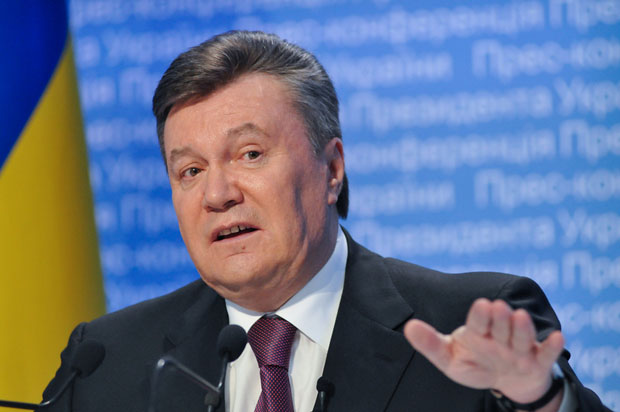
(Image: Oleksandr Nazarov/Demotix)
The Ukrainian president’s failure to sign a treaty securing closer ties with the EU in November, sparked the country’s ongoing Euromaidan protests. The authorities response was heavy handed — police clashed with demonstrators and journalist were targeted, leading to international condemnation. They authorities even briefly implemented a highly repressive new law, among other things allowing security services to monitor the internet, and defining NGOs receiving funding from abroad as “foreign agents”. The law was, however, scrapped only days later following outrage from civil society. Meanwhile,Ukraine’s Prime Minister and government also stepped down, while Yanukovych took four days off ill. He’s back in the office now — just in time head to Sochi for a much-hyped meeting with Putin.
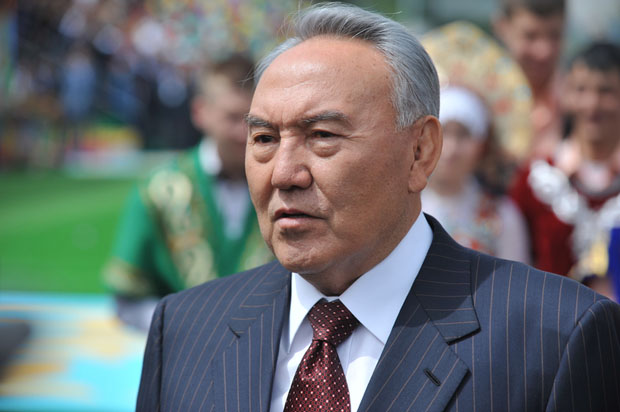
(Image: Vladimir Tretyakov/Demotix)
Kazakhstan’s president has been in power since 1991, and during that time, allegations of human rights abuses, including attacks on demonstrators and independent media, as well as widespread corruption have been regularly levelled at him. In 2012, following clashed between the police and striking workers, the president, who already effectively controls the legislature and the judiciary, further extended his emergency powers. But Putin wouldn’t even be his only high-flying friend. In September, Kanye West performed at his grandson’s wedding. The reported price tag? $3 million. Did I mention the accusations of corruption? Meanwhile, former British prime minister Tony Blair spent two years advising Nazarbayev and his government on democracy and good governance — a deal which “produced no change for the better or advance of democratic rights in the authoritarian nation”.
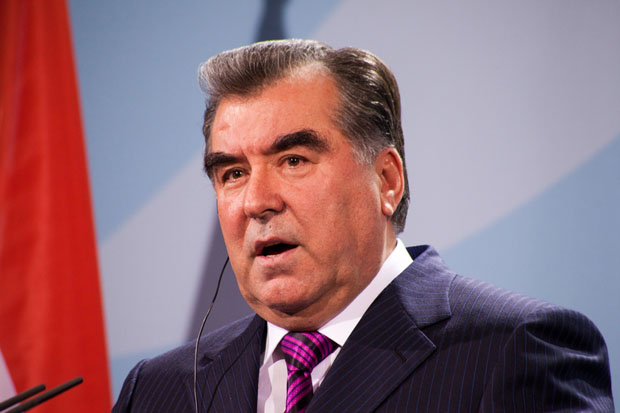
(Image: Riccardo Valsecchi/Demotix)
He has been the head of the government of Tajikistan since 1992, and was in power during the country’s civil war, where 100,000 people lost their lives. Allegations of human rights abuses, including torture by security forces and arbitrary arrests, are widespread. Much of the media is state-controlled, and independent journalists face violence and intimidation. “Publicly insulting the president” can see you jailed for as long as five years. Recently, a prominent member of the opposition, Zaid Saidov, was sentenced to 26 years in prison following what has been described as a “politically motivated trial”. In Sochi, he is set to meet with not only Putin, but also Chinese leader Xi Jinping.
This article was posted on February 7 2014 at indexoncensorship.org
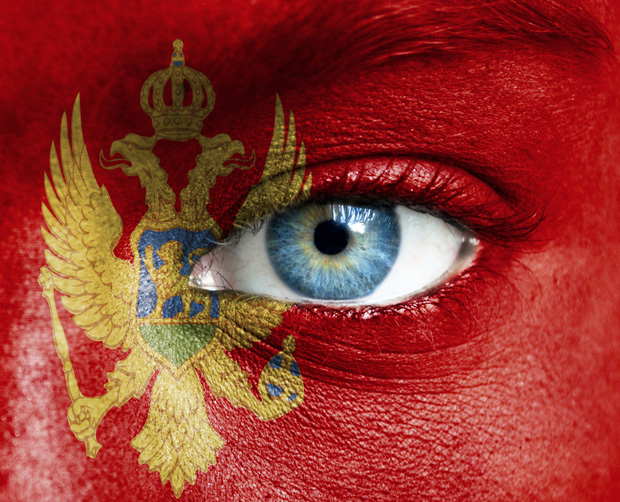
Montenegro is first in line after Croatia to enter the EU, according to some European politicians and parliamentarians; a leader in the Balkan region. But the country’s press is under attack, with Prime Minister Milo Djukanovic leading the line in cracking down on the region’s media.
In the latest Reporters Without Borders Press Freedom Index, Montenegro placed 113th out of 179 countries – a ranking that has deteriorated year on year. Slovenia, a neighbour and EU member, is ranked 35th, and Serbia and Croatia are also far ahead. Even Bosnia and Herzegovina, which by many other parameters unfortunately is behind all of the Balkans, rates well ahead of Montenegro at 68th.
This situation is easily explainable. Only in Montenegro has the rule not changed since the fall of the Berlin Wall. For 24 years the power has been held by the same man – Djukanovic. He is the only one from the generation of ex-Yugoslavian war leaders who is still active in politics. He perceives the media as the greatest threat to his absolute rule.
Over the past few years alone, the founder and editor of a daily newspaper has been killed and seven editors and journalists have been physically assaulted. A number of cars belonging to Vijesti, the independent daily newspaper I co-founded, have been set on fire.
Not only have none of these criminal acts been properly investigated, but the authorities and their institutions have done everything in their power to render the investigations meaningless and to ensure that real culprits are not touched. This has increased self-censorship among journalists; many of them are very concerned by the fact that those who commission the attacks seem untouchable, hidden at the very top the government and the mafia circles close to it.
On 1 September 2012, the fifteenth anniversary of the founding of Vijesti, a director, editor, journalist and photographer from the paper were all attacked. This was a warning to their colleagues not to see what they see and write about what is obvious.
Journalism should be a simple and responsible profession that protects the public interest and defends the society from abuses of the powerful and privileged. But in light of the state of media freedom in Montenegro, practicing journalism has been described by representatives from the Council of Europe as ‘a heroic feat’.
When physical assaults have not delivered the expected results, Djukanovic and his regime have switched to financial ones. He forbade the government, state institutions, municipalities and public companies to advertise in Vijesti. A number of private companies that are close to the prime minister, or whom he can intimidate through tax inspections, were “advised” to avoid us. This has caused millions of Euros worth of financial damage to the paper.
On the other hand, he has relentlessly poured state money into the low-circulation national newspaper Pobjeda, which would otherwise have gone bankrupt a long time ago. He has also launched a TV station with cheap programmes in order to compromise the sustainability of the independent TV station.
Napoleon once remarked: “Four hostile newspapers are more to be feared than a thousand bayonets.” Our newspaper does not consider anyone to be its enemy. However, the all-powerful politicians whose irresponsibility and corruption we report on, perceive us as such. To that we tell them the problem is not on our side – if you do not want to have bad things published on the front page, then don’t do bad things!
Europe has a role to play in this situation. We know that freedom of speech is one of the key conditions for progressing in the European integration, because without free media there is no democratic society. For years, the European administration has been seeking concrete results from Montenegro in the fight against organised crime and corruption. Prime Minister Djukanovic has developed a system that is tantamount to a political trade-off. He is completely cooperative and obedient to Brussels and Washington when it comes to regional issues, such as the recognition of Kosovo, support of the Bosnian state as envisioned in the Dayton Agreement and cooperation with the International Criminal Tribunal for the former Yugoslavia.
In exchange, the US and EU turn a blind eye while the government harangues civil society and independent media.
It is time for an end to this cynical policy. European officials, whether they are in Brussels or Paris, Berlin and London, should start taking stock of the real situation and status of democracy and human rights in Montenegro. Otherwise, Djukanovic will succeed in a what should be an impossible mission – obtaining full EU membership for Montenegro, while simultaneously extinguishing independent media in this new state.
This article was originally posted on 24 Oct 2013 at indexoncensorship.org